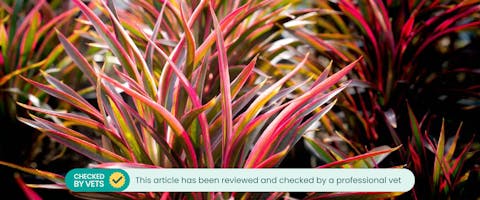Updated 29/09/2023
The ti plant, otherwise known as cordyline fruticosa, are found in striking shades of red, purple and green - making for popular garden plants and holding cultural significance around the world. While they may, on the surface, seem to be a great choice for jazzing up your garden area, is it a safe plant for families with pets? Is cordyline toxic to dogs? Get in the know here.
Trending posts
Purr-use some of the top blogs our members have been loving this month- Top male dog names for your new furry friendGot a new furry family member in your pack? Check…

- Top female dog names for your new fluffy palWelcoming a new pooch into your family? Explore…

- 250+ gray cat names your silver feline will loveRecently welcomed a fluffy gray bundle of joy into…

- What are normal pet sitting rates?Discover the average pet sitting rates for animals…

- Unique dog names to stand out from the packDare to be different with our list of the best…

Is cordyline toxic to dogs?
So, are cordylines poisonous to dogs or are they a safe house and garden plant for those with furry families? Sadly, all parts of the cordyline plant are seriously toxic to dogs if ingested, and so much as a nibble should be treated as an emergency. All parts of the plant are poisonous, but the poison is particularly concentrated in the berries, leaves and roots. The compounds creating the toxicity are the saponins and glycosides - these can cause all kinds of nasty symptoms, including loss of muscle control, vomiting blood and weakness.
Cordyline poisoning in dogs
So, now we’ve established that cordyline is poisonous to dogs, let’s explore the symptoms dogs might experience if any part of the plant is digested, along with common methods of diagnosis and possible treatments.
Symptoms
Like with most plant poisonings in dogs, the symptoms they experience and the severity is determined by the amount of the plant ingested. It will also affect how quickly your pup starts to display symptoms, but either way, you should get to a veterinarian as a matter of emergency, whether symptoms have started or not, and no matter how much has been ingested. Without any further ado, the symptoms of cordyline poisoning in dogs include (but are not limited to):
- Weakness
- Vomiting (with or without blood)
- Loss of muscle control
- Foaming at the mouth
- Lack of appetite or thirst
- Diarrhea
- Dilated pupils
- Abdominal pain
- Increase in heart rate
- Depression
- Convulsions
- Coma
- Death
Diagnosis
If you think your pooch may have ingested part of your cordyline plant, try to take a sample with you to the veterinarian, or take a picture of the plant with you. This will help your vet to decide the type of toxicity your pup is experiencing, and to determine the right treatments moving forward. Also, note down any detail that you can remember (e.g. amount of plant ingested, date and time of ingestion, whether other plants were ingested). Your vet will take a thorough history, so accurate and detailed information also will help your vet to choose the right treatments. Below are some of the methods that your vet will use to determine the right treaments for your dog:
- Thorough history-taking (as mentioned above)
- Physical examination of your dog (includes assessing weight, blood pressure, temperature, pupil reaction time, reflexes, coat and skin condition, respiration)
- Urine sample
- Stool sample
- Blood test to check for organ damage
- X-ray to look for signs of a tummy blockage (aka an “obstructive pattern”) caused by the plant material
Treatments
Your vet’s treatment plan may include any of the following:
- Induced vomiting
- Activated charcoal to prevent further absorption of the poisonous compounds
- IV fluids for flushing out the toxins and rehydration
- Medicine for complications from cordyline poisoning (e.g. organ failure)
Endoscopic/surgical removal of plant material (if it is causing a tummy blockage)
While you may be tempted to administer at-home treatments to your dog before bringing him to the vet - do not administer any at-home treatments before consulting your vet! Each poisoning case is unique and not all pets are suited for at-home treatments. For instance, it is dangerous to induce vomiting in dogs that are showing neurological symptoms.
Meet our veterinary expert, Jnanee
This article has been checked by veterinarian Jnanee Krishnasamy, BVSc (Massey). Dr Jnanee is a small animal veterinarian. She was born in sunny Singapore and spent her formative years there, before studying veterinary medicine at
Massey University. Since graduating from vet school, Dr Jnanee has worked in a variety of settings that include private practice, shelter medicine, and veterinary telemedicine. Due to her varied experiences, she is well-informed on many aspects of the veterinary industry!
Other plants that are poisonous to dogs
Much of the flora us humans love to plant in our gardens and place about our homes are in fact poisonous to dogs, sadly. So, to make sure your home is pup-safe, get in the know about plants poisonous to dogs, starting with our list below.

